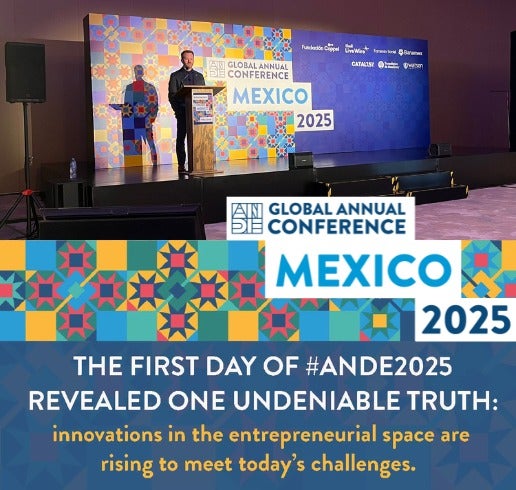
The first day of the ANDE Global Conference 2025 explored how entrepreneurs navigate funding cuts, climate challenges, and credit barriers.
Key insights stressed evidence-based aid, full ecosystem support, and innovative models—from turning waste into value to redefining SME “investability”—to build inclusive futures.
A Call to Action from ANDE’s Leadership
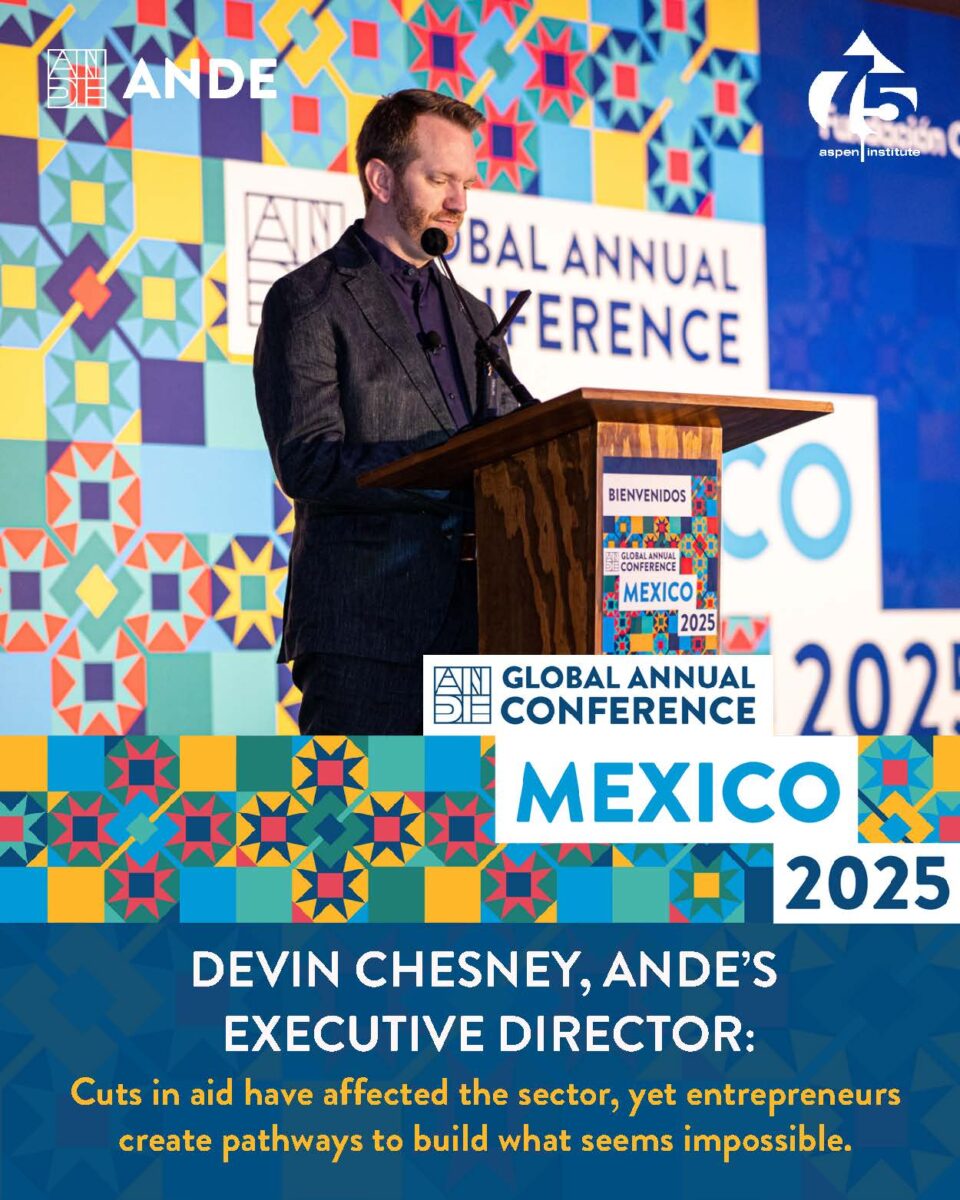 The day opened with welcoming remarks from Devin Chesney, ANDE’s executive director, who reflected on the cuts in international cooperation and the geopolitical tensions slowing the growth of many organizations. He reminded participants that entrepreneurs thrive precisely because they dare to build—against all odds—what only they can imagine.
The day opened with welcoming remarks from Devin Chesney, ANDE’s executive director, who reflected on the cuts in international cooperation and the geopolitical tensions slowing the growth of many organizations. He reminded participants that entrepreneurs thrive precisely because they dare to build—against all odds—what only they can imagine.
Chesney emphasized that ANDE has never been about “the flashiest spectacle,” but about bringing the right people to the table to create conversations that spark action. He argued that the disruption of aid and the realignment of global power offer a window of opportunity for a new paradigm: one where local actors seize control of their economic futures and strengthen ecosystems through partnerships with business, philanthropy, and development institutions.
He also restated ANDE’s mission in simple terms: to make members more effective at helping entrepreneurs grow and to strengthen ecosystems across low- and middle-income countries. A recurring theme was measurement: “You cannot improve what you do not measure,” Chesney stressed, highlighting the importance of curating knowledge, encouraging research, and building members’ capacity to evaluate impact as central to ANDE’s work.
Evidence and Policy Innovation
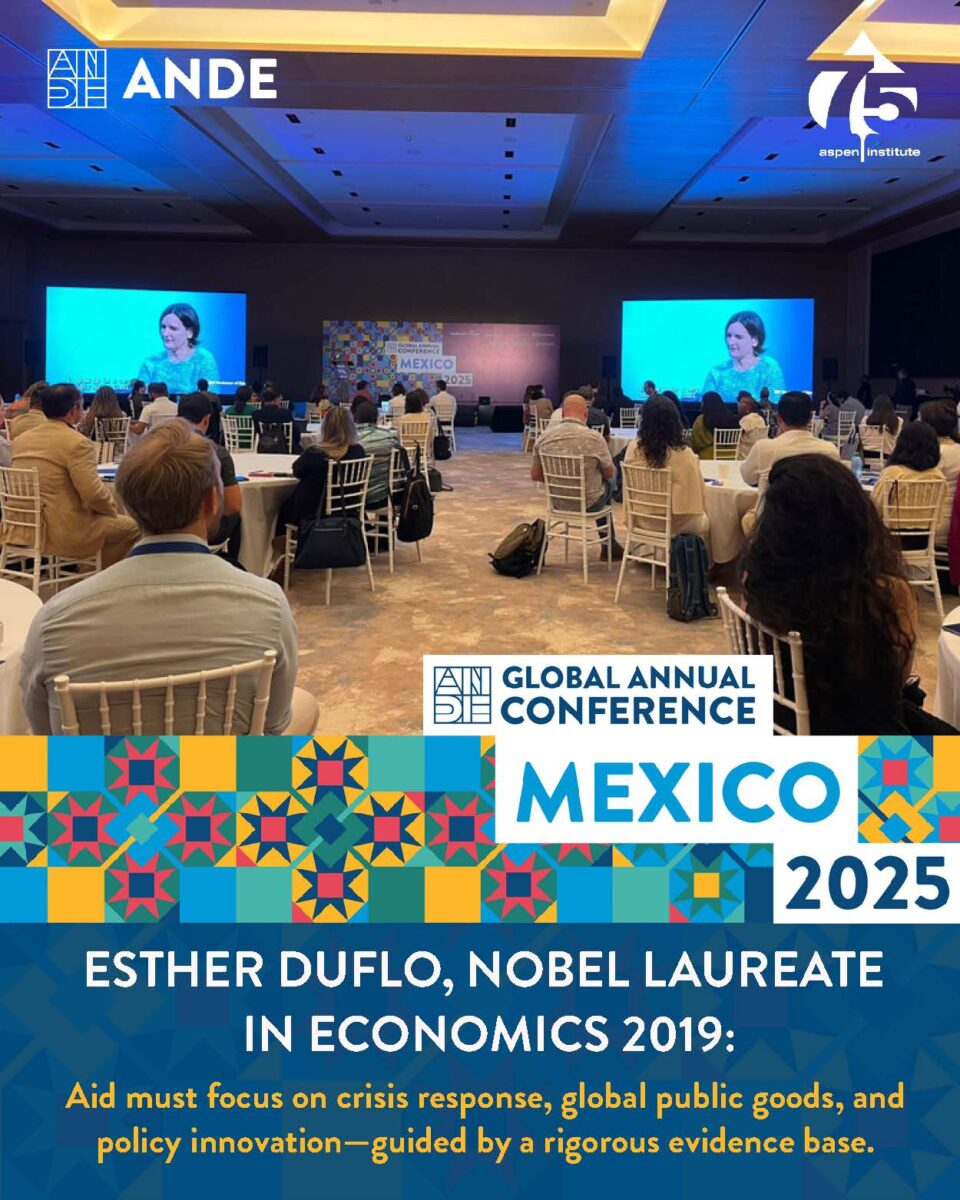 Devin Chesney then introduced a video interview with Esther Duflo, Nobel Laureate in Economics (2019). Duflo outlined three priorities for international aid:
Devin Chesney then introduced a video interview with Esther Duflo, Nobel Laureate in Economics (2019). Duflo outlined three priorities for international aid:
- Responding to crises in countries with limited fiscal capacity, drawing on the example of the COVID-19 pandemic;
- Financing global public goods such as health and climate action; and
- Investing in policy innovation to test and scale what works.
She underscored the importance of rigorous evidence in guiding resource allocation, particularly for governments in low- and middle-income countries that mobilize the vast majority of social and economic investment. Duflo also reminded participants that most people do not aspire to become entrepreneurs—they want stable jobs. The real challenge, she argued, is ensuring that small and growing businesses generate quality employment.
Beyond Capital: Building Ecosystems
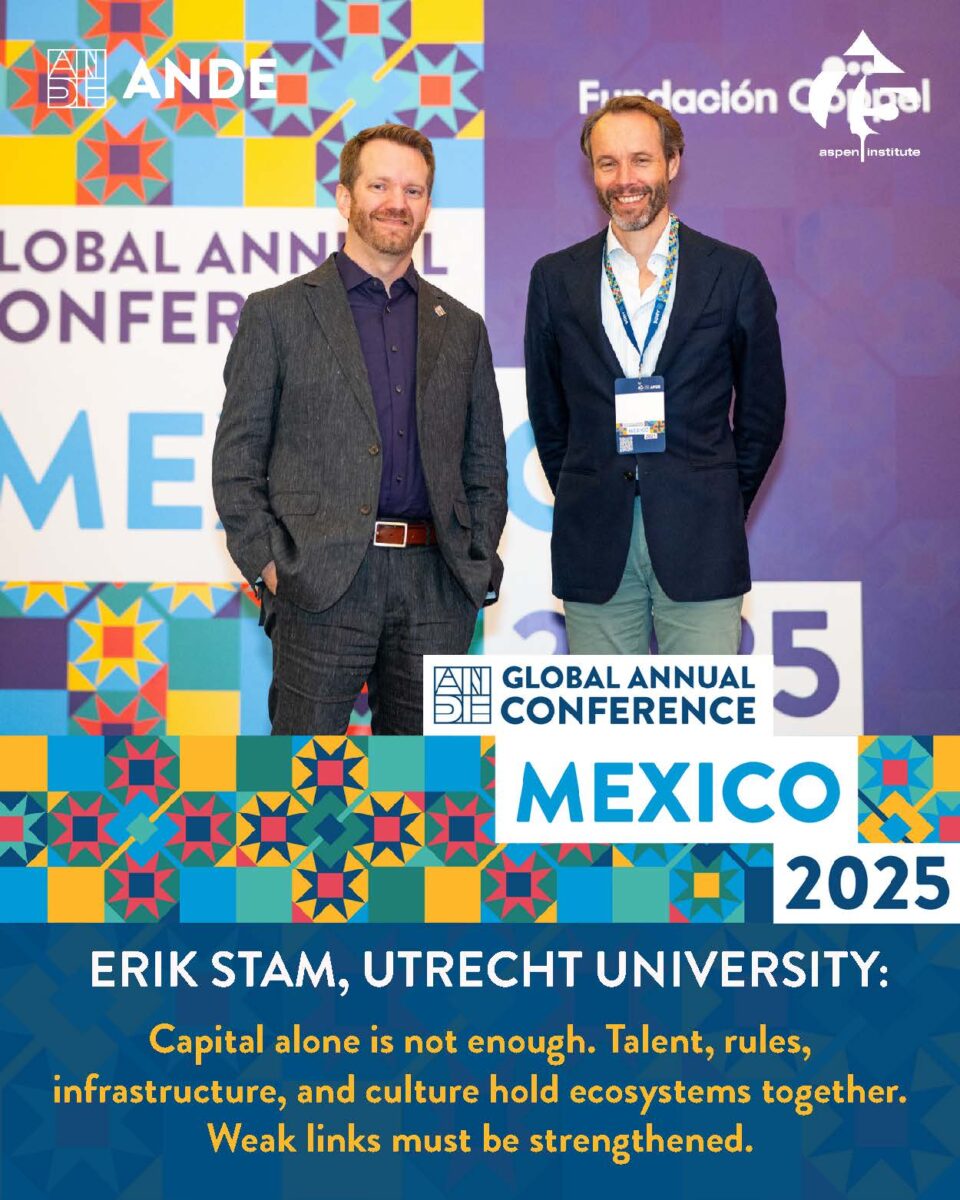 In a fireside chat, Erik Stam, professor at Utrecht University, cautioned that building strong entrepreneurial ecosystems goes far beyond injecting capital. More funding alone, he argued, does not guarantee results without the presence of talent, clear regulations, infrastructure, and a culture that values entrepreneurship.
In a fireside chat, Erik Stam, professor at Utrecht University, cautioned that building strong entrepreneurial ecosystems goes far beyond injecting capital. More funding alone, he argued, does not guarantee results without the presence of talent, clear regulations, infrastructure, and a culture that values entrepreneurship.
For Stam, an ecosystem approach requires identifying weaknesses in each context and reinforcing the elements that sustain it—regulations, financing, networks, support services, and leadership. “A lot of governments want to throw more venture capital into the system,” he said. “That doesn’t necessarily help if there is no market, no enabling rules, and no talent.”
From Waste to Value
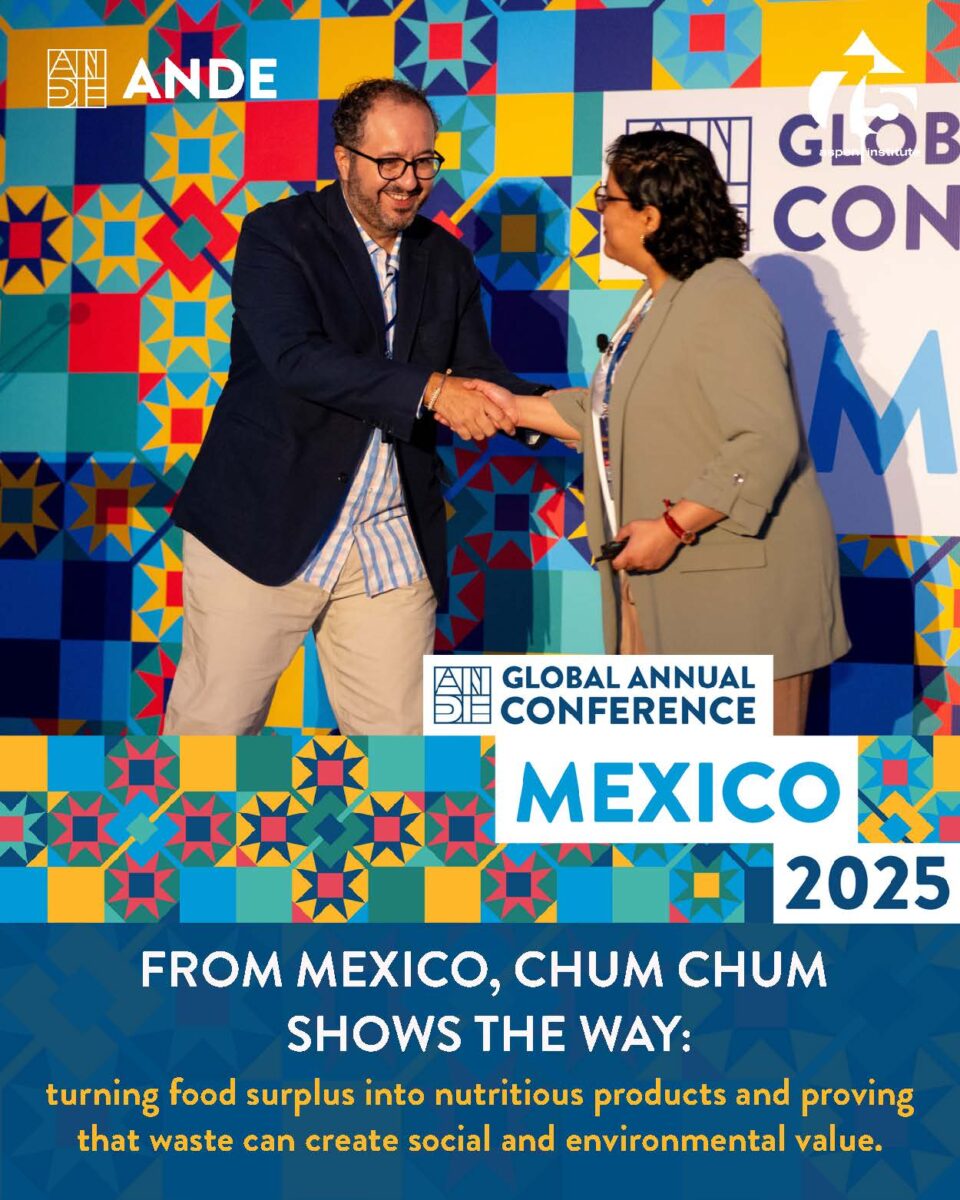
The Entrepreneur Journey session brought these ideas to life with the story of Chum Chum, a Mexican company that transforms food industry surplus into nutritious and sustainable products.
Their model demonstrated that behind every excess lies a resource that can be turned into social and environmental value. Waste becomes opportunity—nourishing communities while opening scalable solutions with global potential.
Climate Entrepreneurship: Trends and Tensions
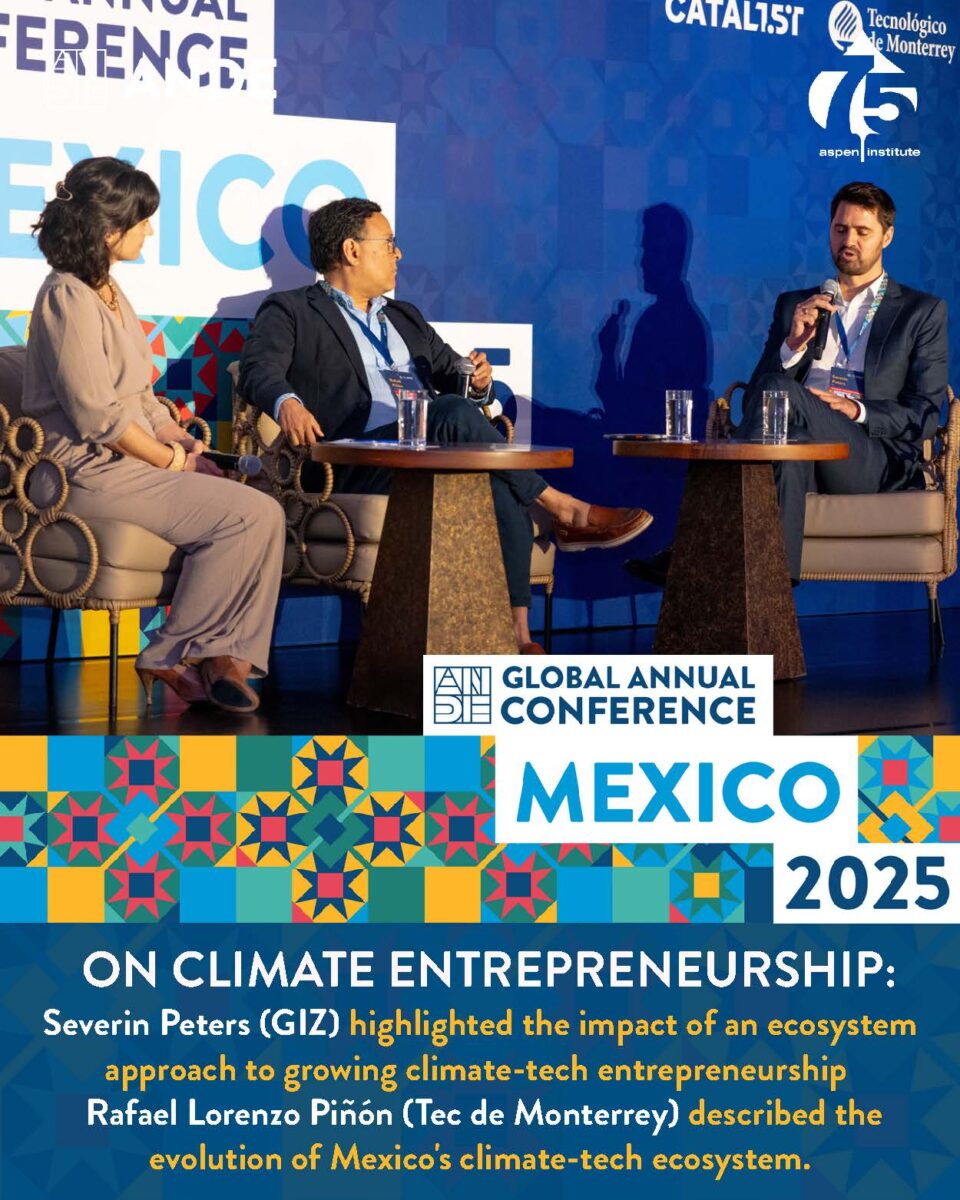 The panel “Innovating for Impact – Trends in Climate Entrepreneurship,” moderated by Kate Scaife Díaz (ANDE), examined how climate-focused ventures are evolving. Severin Peters (GIZ) highlighted the complexity of measuring true climate impact, which requires analyzing the entire life cycle of products against alternatives. He also stressed the decisive role of national and regional governments in providing direction for priority sectors.
The panel “Innovating for Impact – Trends in Climate Entrepreneurship,” moderated by Kate Scaife Díaz (ANDE), examined how climate-focused ventures are evolving. Severin Peters (GIZ) highlighted the complexity of measuring true climate impact, which requires analyzing the entire life cycle of products against alternatives. He also stressed the decisive role of national and regional governments in providing direction for priority sectors.
Rafael Lorenzo Piñón (Tec de Monterrey) emphasized that support for entrepreneurs cannot rely on investor capital alone. He described how the Innovation Hub for Climate brings together corporations, academia, and support organizations to address regional needs and co-create grounded solutions.
Rethinking SME Finance
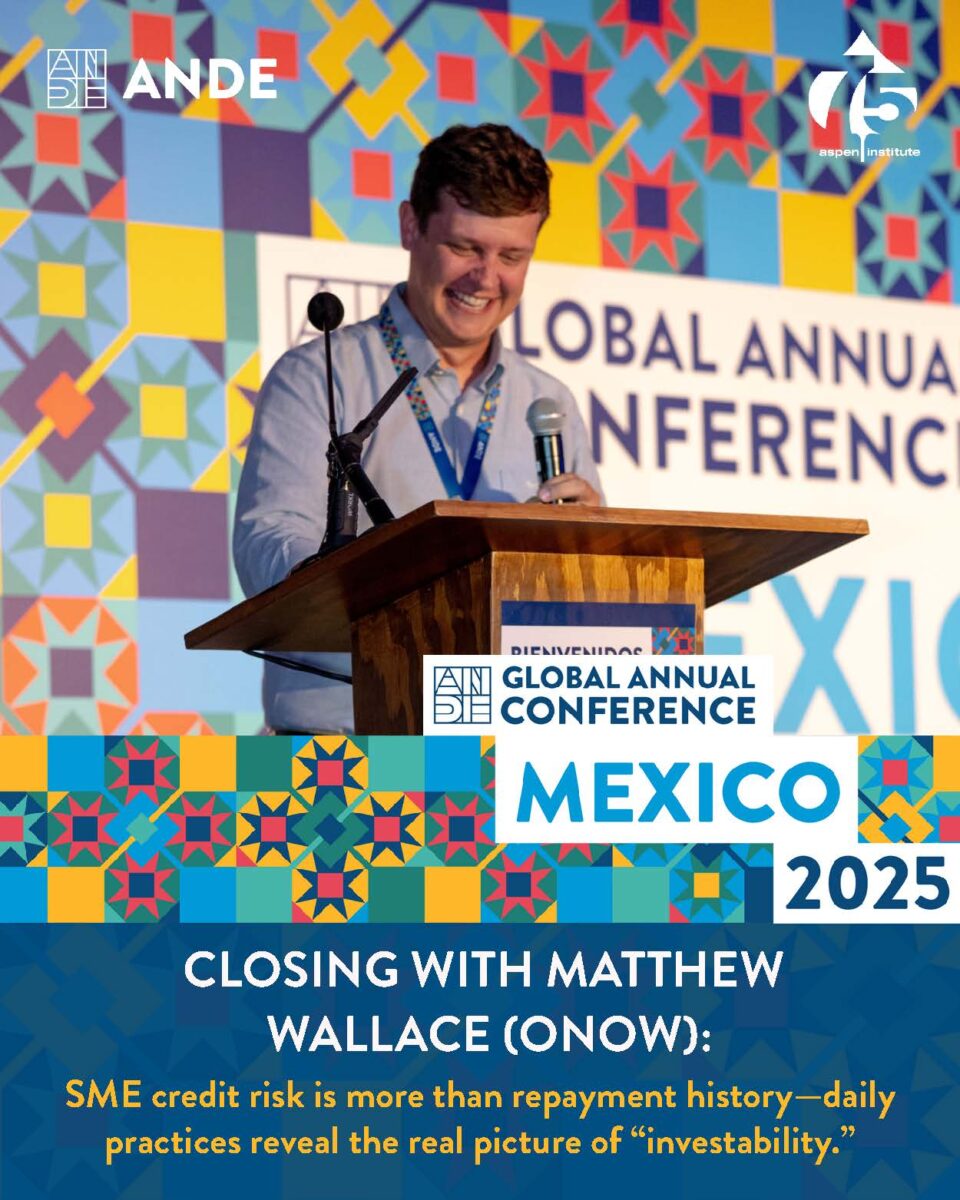 The morning concluded with Matthew Wallace (ONOW), who challenged the notion that repayment history alone can determine SME credit risk. The real signals, he argued, lie in daily business practices: inventory management, customer follow-up, pricing, and supplier payments. ONOW developed a model that translates these practices into clear performance metrics—cash buffer days, profit margins, and timely receivables—making it possible to evaluate true “investability,” where repayment is only part of the picture.
The morning concluded with Matthew Wallace (ONOW), who challenged the notion that repayment history alone can determine SME credit risk. The real signals, he argued, lie in daily business practices: inventory management, customer follow-up, pricing, and supplier payments. ONOW developed a model that translates these practices into clear performance metrics—cash buffer days, profit margins, and timely receivables—making it possible to evaluate true “investability,” where repayment is only part of the picture.
The afternoon sessions showcased how ecosystem collaboration and innovation can be applied across contexts.
- Workshop: From Local Pain Point to Global Playbook – Enviu shared its four-phase venture-building methodology (issue analysis, ideation, validation, and scaling), illustrated by a case study with mango farmers in East Africa. The initiative reduced post-harvest losses through solar-powered cold storage, farmer-owned digital platforms, and local processing, resulting in income increases of more than 20 percent and over 1,000 new jobs. WUSC contributed a gender-responsive approach, emphasizing women’s participation and engaging male allies to challenge restrictive social norms.
- Breakout: Accelerating Inclusive Transitions – Led by Sweef Capital and Solar Sister, this session mapped ecosystem approaches to support women entrepreneurs in climate and clean energy sectors. Discussions focused on access to finance, skills gaps, market access, and impact measurement, highlighting the importance of strengthening networks and sustainability.
The day closed with a participatory roundtable, “Mentors, Not Consultants – Global Talent That Amplifies, Not Replaces.” Participants explored how external expertise can support local capacity without creating dependency. Sticky-note boards filled with ideas and reflections compared the roles of mentors, coaches, and consultants, underscoring that effective mentorship is rooted in empowerment and collaboration rather than substitution.
The first day of the 2025 Global Conference delivered a clear message: scale with evidence, strengthen ecosystems holistically, and back models that solve real problems. From rigorous measurement to climate venture-building, from gender inclusion to mentorship, the conversations underscored that entrepreneurship can only fulfill its promise if it is anchored in resilient, inclusive ecosystems.
Interested in ecosystem transformation and not an ANDE member? Learn more about the benefits of membership. Subscribe to ANDE’s newsletter for updates on the agenda, speakers, and registration for the Global Annual Conference 2025.
